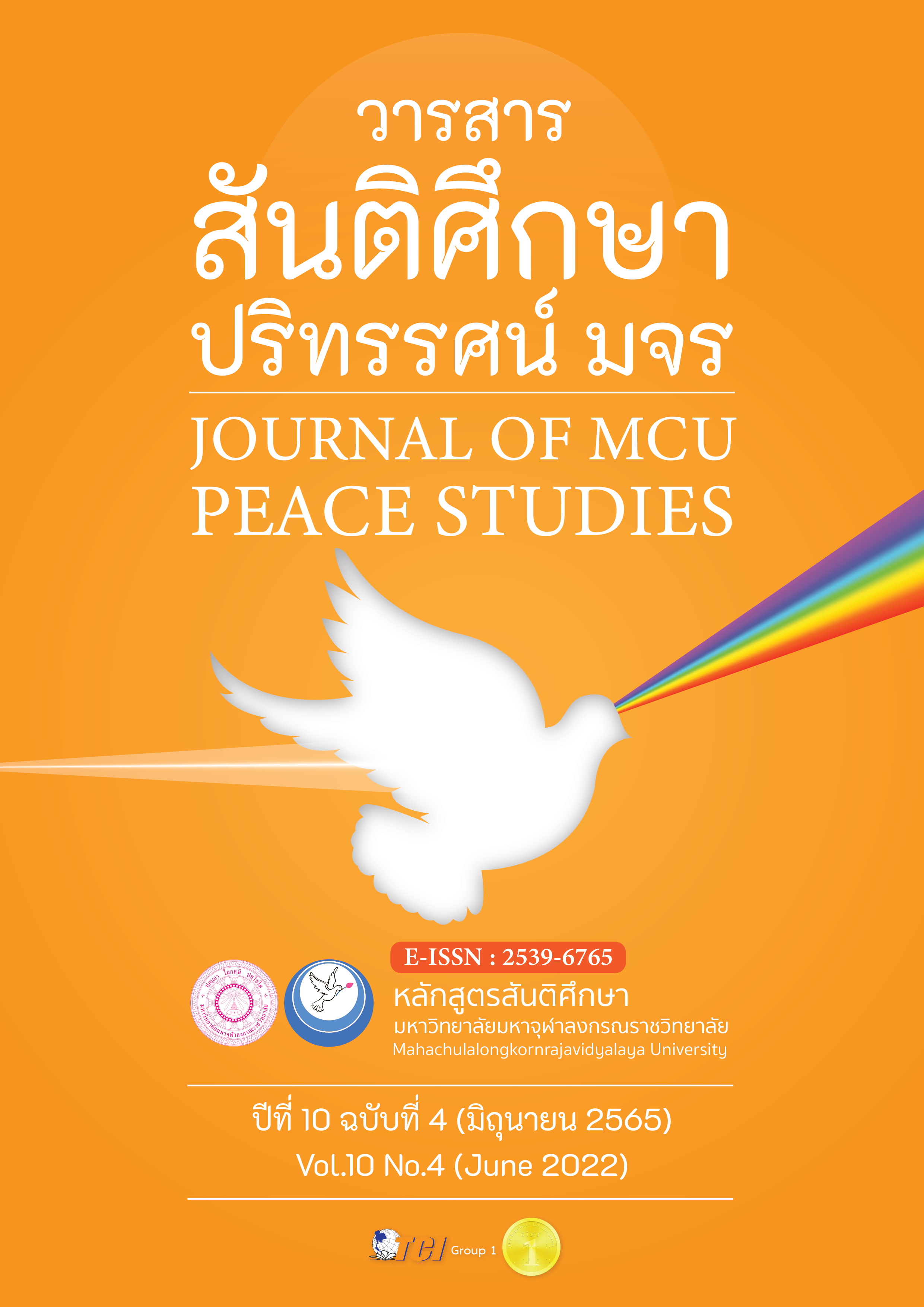รูปแบบพุทธจิตวิทยาวิถีการแพทย์แผนไทยและการแพทย์พื้นบ้าน เพื่อลดความเครียดพนักงานออฟฟิศ
Main Article Content
บทคัดย่อ
บทความวิจัยนี้มีวัตถุประสงค์เพื่อ 1) ศึกษาแนวคิดและทฤษฎี 2) นำเสนอรูปแบบพุทธจิตวิทยา
วิถีการแพทย์แผนไทยและการแพทย์พื้นบ้าน และ 3) พัฒนารูปแบบพุทธจิตวิทยาวิถีการแพทย์แผนไทยและการแพทย์พื้นบ้าน เป็นการวิจัยแบบผสมผสานมีเลือกกลุ่มตัวอย่าง 30 คน จาก 100 คน เป็นการคัดเลือกแบบเฉพาะเจาะจง มีการใช้แบบวัด SPST-20 มาประเมินความเครียด ก่อนและหลังการทดลอง ยืนยันรูปแบบโดยการสนทนากลุ่ม สถิติที่ใช้วิเคราะห์ข้อมูล ได้แก่ ค่าเฉลี่ย ค่าเบี่ยงเบนมาตรฐาน ค่า t-test ค่าสัมประสิทธิ์แอลฟาของครอนบาค ค่า P-Value วิเคราะห์ด้วยเทคนิค 6 ’C
ผลการวิจัยพบว่า 1) แนวคิดและทฤษฎี ได้แก่ แนวคิดเกี่ยวกับความเครียดและการดูแลสุขภาพแบบองค์รวม ทฤษฎีการแพทย์แผนไทยและการแพทย์พื้นบ้าน หลักอริยสัจ 4 หลักพละ 5 การสวดมนต์ เจริญสมาธิ การให้คำปรึกษารายบุคคล หลักจิตวิทยา Lazarus and Folkman’s และการเปลี่ยนแปลงภายใน
21 วัน 2) รูปแบบพุทธจิตวิทยาวิถีการแพทย์แผนไทยและการแพทย์พื้นบ้าน ได้แก่ รูปแบบการตอกเส้น
จัดกระดูก นวดรักษา ยาสมุนไพร กิจกรรมช่วยคลายความเครียด การให้คำปรึกษารายบุคคล มีการนัดหมาย ให้มาทำการบำบัดอย่างต่อเนื่องสัปดาห์ละครั้ง มีการติดตามและประเมินผลการบำบัด รวมระยะเวลาทดลอง 3 เดือน 3) การพัฒนารูปแบบพุทธจิตวิทยาวิถีการแพทย์แผนไทยและการแพทย์พื้นบ้าน เป็นการบูรณาการหลักพุทธจิตวิทยากับแพทย์แผนไทยและแพทย์พื้นบ้าน ประกอบด้วย 1) การสวดมนต์ เจริญสมาธิแบบเคลื่อนไหวและเจริญสมาธิแบบอานาปานสติ 2) คิดบวก เมื่อปฏิบัติเป็นประจำจะเกิดความสงบในใจ มีสติ
อยู่กับปัจจุบัน มีลักษณะ “4 ดี” คือ ร่างกายดี จิตใจดี สิ่งแวดล้อมดี ปัญญาดี
Article Details

อนุญาตภายใต้เงื่อนไข Creative Commons Attribution-NonCommercial-NoDerivatives 4.0 International License.
ทัศนะและความคิดเห็นที่ปรากฏในบทความในวารสาร ถือเป็นความรับผิดชอบของผู้เขียนบทความนั้น และไม่ถือเป็นทัศนะและความรับผิดชอบของกองบรรณาธิการ ยินยอมว่าบทความเป็นลิขสิทธิ์ของวารสาร
เอกสารอ้างอิง
Biggs, A., Brough, P., & Drummond, S. (2017). Lazarus and Folkman's Psychological Stress and Coping Theory. (1st ed.). New Jersy:John Wiley & Sons, Ltd.
(2003). Enough Workplace Stress: Organizing for Change. (1st ed.). Ontario: CUPE.
Boon-Art, N. (2018). An Effect of Buddshist Psychology-based Humanized Healthcare Program. (Doctoral Dissertation). Mahachulalongkorn University. Ayutthaya.
Chanate, P. (2018). A Buddhist Psychological Model for Holistic Healthcare and Promotion and Traditional Thai Medicine. (Doctoral Dissertation). Mahachulalongkorn University. Ayutthaya.
Chanrattanayothin, P. (2016). Health promotion guideline for Herniated disc patients with Lanna wisdom. (Master’s Thesis). Mahasarakham University. Mahasarakham.
Chiangkuntod, S. (2017). Development of D-PROMPT program to reduce stress among nursing students in Fundamental Nursing Practicum of the Faculty of Nursing, Siam University. (Doctoral Dissertation). Mahachulalongkorn University. Ayutthaya.
Cleveland Clinic medical professional. (2015). Stress: Signs, Symptoms, Management & Prevention. Retrieved March 10, 2020, from https://my.clevelandclinic.org/health/articles/6406
Corey, G. (2004). Theory and Practice of Counseling & Psychotherapy. (10th ed.) Massachusetts: CENGAGE LEARNING.
Davidson, R. J., & Kaszniak, A. W. (2015). Conceptual and methodological issues in research on mindfulness and meditation. American Psychologist, 70(7), 581–592.
Jaret, P. (2018). How to Find an Authentic Mindfulness Teacher. Retrieved August 10, 2020, from https://www.mindful.org/how-to-find-an-authentic-mindfulness-teacher/
Kanjanawasee, S. (2001). Selection of appropriate statistics for research.
(4th ed.). Bangkok: Boonriri Printing.
Lazarus, R.S. (2000). Toward Better Research on Stress and Coping. American Psychologist, 55(6), 665–673.
Manager Online. (2020). COVID-19. Retrieved November 20, 2020, from https://mgronline.com/local/detail/9630000106942
Mayo Clinic Staff. (2020). Meditation: A simple, fast way to reduce stress. Retrieved May 10, 2020, from https://www.mayoclinic.org/tests-procedures/meditation/in-depth/meditation/art-20045858
Mayo Clinic Staff, (2020). Positive thinking: Reduce stress by eliminating negative self- talk to reduce stress. Retrieved March 10, 2020, from
https://www.mayoclinic.org/healthy- lifestyle/stress-management/in-depth/positive-thinking/art-20043950
Prunners, J. (2011). Stress in the city: Brain activity and biology behind mood disorders of urbanites. ScienceDaily, pp. 1-2
Ritwichai, A. (2018). Sick building syndrome and stress among office workers. Master of Science. (Master’s Thesis). Chulalongkorn University. Bangkok.
Sriplang, T. (2015). Development of life Quality by Past Life Regression Therapy According to Intergrated Psychology Approach. (Doctoral Dissertation). Mahachulalongkorn University. Ayutthaya.
Sutthipong, R., & Janyong, P. (2018). The Stress of Bannacornban People in Dontako Subdistrict. National Conference Muban Chombueng Rajabaht Research, 6(2), 553-562.
Wongrattana, C. (2001). Techniques for using statistics for research. (1sted.). Bangkok: Chulalongkorn University.


